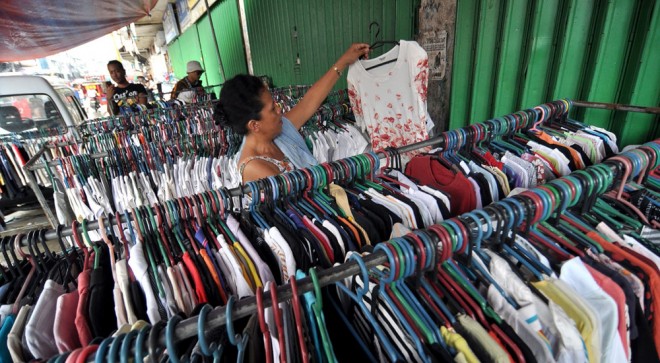Cinco huli, lusot veinte.
Millions of pesos in government revenue have been lost to this illegal practice at the Bureau of Customs (BOC), where for every 25 shipments of imported ukay-ukay, or used clothing, five are seized by the agency while the rest are promptly released to consignees upon payment of tara, or grease money, to corrupt customs personnel.
This was disclosed to the Inquirer on Tuesday by a newly appointed BOC official, who said a group of big-time players, led by “Mr. T,” has cornered the illegal ukay-ukay importation trade under the Aquino administration.
T is short for “a certain Mr. Teves,” the official said.
The importation of second-hand clothes is banned under Republic Act. No. 4653, or the “Act to safeguard the health of the Filipino people and maintain the dignity of the nation through the prohibition of the importation of used clothing and rags” and under the Tariffs and Customs Code of the Philippines.
Misdeclaration, ‘swing’
The ban has prompted smugglers to misdeclare ukay-ukay imports as general merchandise, among other items, said the source.
The smugglers have also benefited from the so-called “swing” scheme practised by some BOC and ports officials and employees, who simply look the other way as ukay-ukay and other smuggled goods are transferred from ships or carriers directly to waiting trucks at the piers.
“In exchange for the usual grease money, of course,” said the same source.
He said the “proof of the government’s failure to stop the smuggling of ukay-ukay is the continued proliferation of ukay-ukay stores nationwide.”
In separate interviews, the official’s disclosures were confirmed by some BOC old-timers, one of whom said, “Don’t belittle the revenue lost to ukay-ukay smuggling … Milyones yan, ’di barya-barya lang. (It runs in the millions.)”
Late last year, then Customs Commissioner Ruffy Biazon said the agency would release millions of pesos worth of smuggled ukay-ukay, as well as rice and construction materials, to help the government’s relief efforts for the victims of Supertyphoon “Yolanda.”
Biazon told this paper the items were prepared in various ports around the country to be turned over to the Department of Social Welfare and Development (DSWD).
The former Muntinlupa City legislator said the BOC would make an inventory of the confiscated goods in the ports to determine the availability of items they can donate to the DSWD.
In September, Biazon said the BOC planned to turn over P40 million worth of smuggled ukay-ukay to the department, noting “it’s the best option because used clothing cannot be disposed of by auction since these are prohibited goods.”
In January 2012, P20 million worth of illegally imported ukay-ukay went to the Northern Mindanao folk who were displaced by floods spawned by Tropical Storm “Sendong.”
Ma’am T
The BOC early this month, meanwhile, lost several millions of pesos due to the alleged undervaluation of over 140 containers of imported steel products and tiles by a group led by “Ma’am T,” another big-time player at the agency.
“Worse, the shipment also resulted in the entry of more substandard steel products from China,” a bureau insider said.
At the BOC, Ma’am T is also known as “Ma’am Tina,” which is short for “a certain Tina Yu,” who also uses the aliases “Tina Vidal” and “Tina Lapid.”
Another BOC official earlier said the bureau had been losing more than P5 billion a year to undervalued plastic manufacturing materials imported by Ma’am T’s group.
“Because of her, the importation of plastic resin products, mainly by front business firms or consignees being used by her group, has become centralized,” the official said.
Like other players, Ma’am T “can influence the volume of imports handled by the bureau, either by withholding or bringing in more shipments to help the BOC meet its monthly collection targets.”
That is, if the mutually agreed tara is met between them and their contacts at the BOC, the source added.
Lost revenue
From 2002 to 2011, the government lost more than P1.33 trillion in revenue due to smuggling through the country’s ports, according to the Federation of Philippine Industries (FPI), which groups about 800 companies.
In a 20-page study, the FPI said lost revenue from 2002 to 2008 came up to P889.5 billion, with further losses of P119.65 billion in 2009 and P326.76 billion in 2010 and 2011.
The group arrived at those figures by finding the “disparities in import data” from the BOC and the International Monetary Fund.
President Aquino earlier said the government had been losing at least P200 billion in revenue each year due to smuggling activities in the country’s ports.
And customs officials can’t seem to do anything about it.
RELATED STORIES
Smuggling raps vs ‘ukay-ukay’ importers
Brrr nights bring out ‘winter’ wear in Baguio
